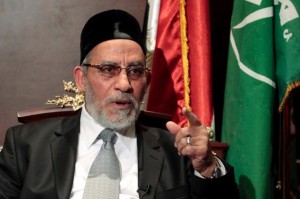 The spiritual leader of the Muslim Brotherhood, General Guide Mohammed Badie, has been arrested in Cairo, Egyptian officials say.
The spiritual leader of the Muslim Brotherhood, General Guide Mohammed Badie, has been arrested in Cairo, Egyptian officials say.
Reports said he was detained at a residential flat in Nasr City.
A state of emergency is in force in Egypt amid turmoil following a crackdown on Islamists in which hundreds have died.
A three-day period of mourning has been declared for 25 policemen killed in the Sinai peninsula by suspected Islamists.
And 36 Islamist protesters died in a prison van in the capital Cairo on Sunday.
Almost 900 people, including more than 100 police and soldiers, are reported to have been killed in Egypt since Wednesday, when the army cleared protest camps set up by supporters of deposed President Mohammed Morsi, many of them members of the Muslim Brotherhood movement.
Protests suppressed
Hundreds of members of the Muslim Brotherhood have been detained over recent days.
Mr Badie had been on the run as interim authorities in Egypt try to suppress protests at the ousting of Mr Morsi.
He is facing charges of inciting violence and murder over the killing of eight anti-Brotherhood protesters outside the movement’s headquarters in Cairo last June.
Officials and state media said Mr Badie was detained in a flat in Nasr City in north-east Cairo, near the site of one of the protest camps bloodily broken up last week.
His arrest comes days after his son Ammar Badie, 38, was shot dead during protests in the capital’s Ramses Square.
Mr Badie’s deputy, Khairat al-Shatir, was arrested in the days following Mr Morsi’s overthrow.
Correspondents say his detention will further ratchet up tensions in the deeply divided country, where an indefinite dusk till dawn curfew is in place.
Images of Mr Badie shortly after his arrest were shown on the private channel ON TV – a sign that the interim government is bent on humiliating the Brotherhood and weakening it as much as they can prior to any possible negotiations, says Youssef Taha, Middle East producer for the BBC’s World Service.
He says there is no obvious candidate of Mr Badie’s calibre to step into his shoes and a vacuum may ensue.
The attack on the Sinai police convoy, close to the town of Rafah on the Gaza border, was one of the deadliest on security forces in several years.
The off-duty police officers were reportedly ordered to leave the buses before being shot in the back of the head.
State television showed their flag-draped coffins arriving by plane in Cairo.
“Those Brotherhood terrorists have to be killed now by the hands of decent citizens,” Ayman Mohamed – introduced as a cousin of one of the dead – was shown saying, according to Reuters news agency.
In a separate incident, another police officer was killed in the north Sinai town of el-Arish.
Attacks by Islamist militants on the Egyptian security forces have surged in northern Sinai since 2011 – they have been close to daily in recent weeks.
Mubarak ‘to be released’
European Union foreign ministers will meet on Wednesday to decide whether to cut some of the billions of euros in aid pledged to Egypt.
Meanwhile, Egyptian prosecutors have added a further 15 days to ousted President Morsi’s detention while they investigate fresh allegations against him.
He has reportedly been accused of complicity in acts of violence against protesters outside the presidential palace last December. His detention had already been extended by 30 days in a separate case on Thursday.
And a lawyer for another former leader, Hosni Mubarak, has said he hopes his client could be released from prison within the next two days.
Lawyer Fareed al-Dib told the BBC that Mubarak had been cleared of one corruption charge and they were waiting for the court to check whether he still had to be held in custody on other counts.
Mubarak is facing a retrial for corruption and complicity in the deaths of protesters during the 2011 uprising which ended in his removal from power after 30 years.
While it is still no more than a rumour, his release would be seen by many Egyptians as a signal that the military is rolling back the changes that flowed from the uprising of 2011, the BBC’s Kevin Connolly reports from Cairo.
BBC

Leave a Reply
You must be logged in to post a comment.